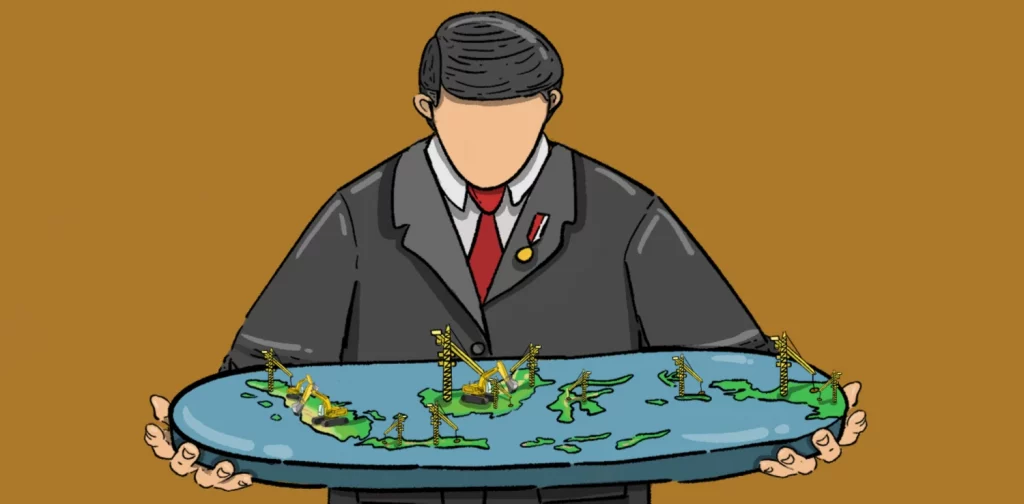Indonesia Needs Better Natural Resource Management and Leadership from the Next President

Illustration: Irhan Prabasukma
Energy transition and decarbonization have become important agendas for nations worldwide. Many frameworks, strategies, and technologies have been introduced to support these agendas, such as coal-fired power plants (CFPP) early retirement, carbon capture and storage, and electric vehicles. However, these efforts toward a net-zero goal are met with challenges in natural resource management, even in countries with abundant natural resources. This is the case in Indonesia.
When discussing natural resource management, we don’t only talk about the resources taken but also the wellbeing of the communities impacted. Environmental impacts and social conflicts are often reported in relation to this issue.
Natural resource management has much to do with policy and structural strategies, making the government the one with the biggest responsibility. Therefore, the next Indonesian president must be better than his predecessors at managing natural resources as well as enforcing environmental and social protection for all.
The Complex Just Energy Transition
Indonesia’s energy transition agenda was introduced during its G20 Presidency in 2022. However, in February 2024, its execution is still at the negotiation stage among stakeholders. This is because energy transition must be just to ensure no one is left behind.
Poorly planned programs and strategies in energy transition can negatively impact the regional economy and people’s livelihoods. This is evident in the phase-out plan of CFPPs. Only two CFPPs have been targeted for early retirement so far, namely Cirebon-1 and Pelabuhan Ratu, which are due for retirement in 2035 and 2037, respectively. Unfortunately, the negotiations for both CFPPs are still focused on the acquisition and financial stage while overlooking the fact that early retirement of CFPPs can cause massive labor termination.
Based on research conducted by non-profit organizations CELIOS and CERAH in three regencies, the early retirement of CFPPs can cause the termination of 14,022 workers and a decrease in regional income of 3.96 trillion IDR (253 million USD). This research suggests that CFPPs should be replaced with renewable energy, with an emphasis on re-employing displaced CFFP workers.
Unfortunately, it remains unclear whether Pelabuhan Ratu or Cirebon-1 would be replaced by a power plant with a different energy source, decommissioned, or dismantled entirely. A clear retirement scenario is needed to ensure the CFPP operation can formulate the necessary steps and produce positive impacts on the surrounding communities.
The same can be said about Indonesia’s attempt to downstream the mineral industry–which is one of the National Strategic Projects (Proyek Strategis Nasional, or PSN). For instance, the Indonesian nickel industry, which is looking at accelerated smelter development to increase electric vehicle production, is reported to have caused negative impacts, such as coastal environmental degradation and confiscation of residential land.
Poorly Planned National Strategic Projects
The objective of Indonesia’s PSN policy is to ensure the nation can reach economic, food, and energy security through nationally strategic projects. As addressed in Government Regulation 42/2021, PSNs are given exemptions in certain areas to streamline their preparation and operation.
Moreover, PSNs are permitted to use the national forest estate. The ministerial regulation allows certain business activities in the forest estate, such as industries, energy, and transportation. This combination contributes to the many environmental impacts occurring in these projects.
A perfect example of a poorly executed PSN is the food estate project in Central Kalimantan. As a PSN, it is allowed to be developed within the Protected Forests. The Indonesian Forum for Environment (WALHI) reported ecological disasters in the form of increased flood levels from 10-40 cm to 1-1.5 m at Gunung Mas Regency after the establishment of a food estate. Greenpeace also reported cultural land confiscation of Dayak tribes; about 860 hectares of certified cultural land have been converted into the food estate project.
Land and Agrarian Conflicts
Overlapping concessions have been a persisting issue in natural resource management since the New Order era. CIFOR reported that this is a product of the regional autonomy policy, which caused the “legalization” of illegal concessions.
In 2021, the Coordinating Ministry of Economic Affairs reported 5.2 million hectares of mining concessions within the forest estate. Additionally, 4.7 million hectares of concessions neither had nor complied with the Forestry Borrow-to-Use Permit (Izin Pinjam Pakai Kawasan Hutan, or IPPKH).
The One Map Policy (OMP) was introduced in 2016 to solve land governance issues. However, the process of integrating data from different institutions and consultation with Indigenous groups on cultural land is very difficult.
Astuti and McGregor reported that only 5-40% of data were present at the district level. This is due to poor documentation and the presence of ‘sensitive’ data, presumed to be illegal concessions. Silviana found there were a number of land ownership boundaries that were overlapping and became the cause of conflicts. Nurwadjeji et al. also found inconsistency in the presentation of maritime data.
Thus, OMP is hardly an absolute reference for land governance to this day. Consequently, about 115 agrarian conflicts regarding PSN occurred between 2020 and 2023. Of course, these conflicts negatively impacted the welfare and wellbeing of the surrounding communities.
Firm and Fair Law Enforcement for Better Natural Resource Management
The most common issue in implementing environmental policy is poor law enforcement. Energy economist Fahmy Raidy from Universitas Gadjah Mada explained that poor law enforcement in environmental affairs tends to occur when government-affiliated parties are involved. JATAM reported there are many government officials in Indonesia associated with the large mining companies. This situation has the precedent and potential to complicate law enforcement.
The road toward sustainable natural resource management is long and winding. It requires a robust policy framework, layers of bureaucracy and studies, as well as accountability from businesses. However, all of that is meaningless without firm, fair, and just law enforcement. Only then shall environmental violations be judged properly and natural resource management be implemented effectively.
Read the original article in Indonesian at Green Network Asia – Indonesia.
Editor: Abul Muamar & Nazalea Kusuma
Translator: Kresentia Madina
Publish your thought leadership and insights with Green Network Asia, learn more about our Op-ed Article Guidelines.

Subscribe to Green Network Asia
Strengthen your personal and professional development with cross-sectoral insights on sustainability-related issues and sustainable development across the Asia Pacific and beyond.

Lalita Fitrianti
Lalita is the Manager for Programs & Partnerships at Green Network Asia. She graduated from the University of Queensland, Australia, with a master’s degree in Environmental Management. She is an environmental and biodiversity impact specialist, strengthening Green Network Asia’s programs & partnerships particularly within environmental lenses.


 How Plant the Emirates Aims to Support Food Self-Sufficiency in the UAE
How Plant the Emirates Aims to Support Food Self-Sufficiency in the UAE  GRI’s Updated Sustainability Standards on Climate Change and Energy
GRI’s Updated Sustainability Standards on Climate Change and Energy  Looking into Biochar as a Bioremediation Agent
Looking into Biochar as a Bioremediation Agent  Australian Climate Visa for Citizens of Tuvalu: Showcasing cross-border partnership in light of the climate crisis
Australian Climate Visa for Citizens of Tuvalu: Showcasing cross-border partnership in light of the climate crisis  Nickel Mining in Raja Ampat and the Widespread Cost of Natural Resource Exploitation
Nickel Mining in Raja Ampat and the Widespread Cost of Natural Resource Exploitation  Lumbung Sosial: Challenges and Opportunities of Indonesia’s Social Barn Program
Lumbung Sosial: Challenges and Opportunities of Indonesia’s Social Barn Program